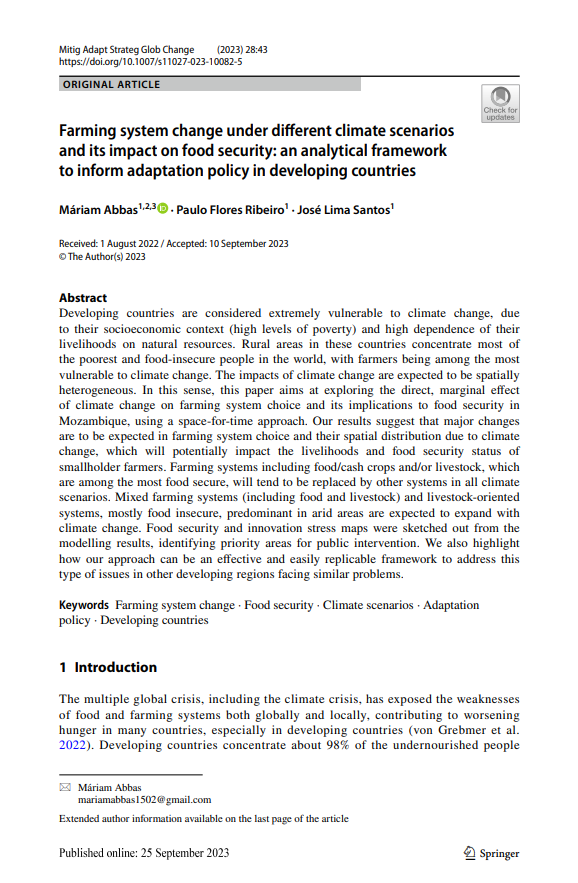Farming System Change Under Different Climate Scenarios and its Impact on Food Security: an analytical framework to inform adaptation policy in developing countries

Title: Farming System Change Under Different Climate Scenarios and its Impact on Food Security: an analytical framework to inform adaptation policy in developing countries
Author(s): Máriam Ribeiro Abbas, Paulo Flores Santos & José Lima
Publication Date: 2023
Publisher: Springer
Quotation: Abbas, M., Ribeiro, P.F. & Santos, J.L. Farming System Change Under Different Climate Scenarios and its Impact on Food Security: an analytical framework to inform adaptation policy in developing countries. Mitig Adapt Strateg Glob Change 28, 43 (2023). https://doi.org/10.1007/s11027-023-10082-5
Abstract: Developing countries are considered extremely vulnerable to climate change, due to their socioeconomic context (high levels of poverty) and high dependence of their livelihoods on natural resources. Rural areas in these countries concentrate most of the poorest and food-insecure people in the world, with farmers being among the most vulnerable to climate change. The impacts of climate change are expected to be spatially heterogeneous. In this sense, this paper aims at exploring the direct, marginal effect of climate change on farming system choice and its implications to food security in Mozambique, using a space-for-time approach. Our results suggest that major changes are to be expected in farming system choice and their spatial distribution due to climate change, which will potentially impact the livelihoods and food security status of smallholder farmers. Farming systems including food/cash crops and/or livestock, which are among the most food secure, will tend to be replaced by other systems in all climate scenarios. Mixed farming systems (including food and livestock) and livestock-oriented systems, mostly food insecure, predominant in arid areas are expected to expand with climate change. Food security and innovation stress maps were sketched out from the modelling results, identifying priority areas for public intervention. We also highlight how our approach can be an effective and easily replicable framework to address this type of issues in other developing regions facing similar problems.
Identifier: https://doi.org/10.1007/s11027-023-10082-5
Category: Outras publicações
Abstract:
Developing countries are considered extremely vulnerable to climate change, due to their socioeconomic context (high levels of poverty) and high dependence of their livelihoods on natural resources. Rural areas in these countries concentrate most of the poorest and food-insecure people in the world, with farmers being among the most vulnerable to climate change. The impacts of climate change are expected to be spatially heterogeneous. In this sense, this paper aims at exploring the direct, marginal effect of climate change on farming system choice and its implications to food security in Mozambique, using a space-for-time approach. Our results suggest that major changes are to be expected in farming system choice and their spatial distribution due to climate change, which will potentially impact the livelihoods and food security status of smallholder farmers. Farming systems including food/cash crops and/or livestock, which are among the most food secure, will tend to be replaced by other systems in all climate scenarios. Mixed farming systems (including food and livestock) and livestock-oriented systems, mostly food insecure, predominant in arid areas are expected to expand with climate change. Food security and innovation stress maps were sketched out from the modelling results, identifying priority areas for public intervention. We also highlight how our approach can be an effective and easily replicable framework to address this type of issues in other developing regions facing similar problems.
Quotation:
Abbas, M., Ribeiro, P.F. & Santos, J.L. Farming System Change Under Different Climate Scenarios and its Impact on Food Security: an analytical framework to inform adaptation policy in developing countries. Mitig Adapt Strateg Glob Change 28, 43 (2023). https://doi.org/10.1007/s11027-023-10082-5





